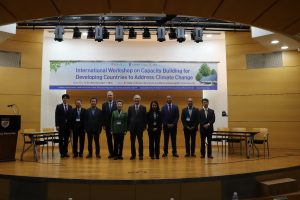 Seoul, November 7 – The Global Green Growth Institute (GGGI) co-hosted the International Workshop on Capacity Building for Developing Countries to Address Climate Change at Korea University today. The conference was organized by the Center for Global Climate and Marine Governance of Korea University, and hosted by GGGI, the UNDP Seoul Policy Center, the Green Asia Organization, and the Center for Climate and Sustainable Development Law and Policy (CSDLAP).
Seoul, November 7 – The Global Green Growth Institute (GGGI) co-hosted the International Workshop on Capacity Building for Developing Countries to Address Climate Change at Korea University today. The conference was organized by the Center for Global Climate and Marine Governance of Korea University, and hosted by GGGI, the UNDP Seoul Policy Center, the Green Asia Organization, and the Center for Climate and Sustainable Development Law and Policy (CSDLAP).
The former Environment Minister of Republic of Korea, Her Excellency Young Sook Yoo kicked off the opening session emphasizing the importance of enhancing capacity building in developing countries for climate resilience and climate financing to achieve the Paris Agreement goals. The former Vice Minister of Ministry of Foreign Affair, His Excellency Kak-soo Shin also highlighted the importance of sharing experience with developing countries as part of urgent climate action in his congratulatory remarks.
In his congratulatory remarks, Dr. Frank Rijsberman spoke about good practices of countries, especially by giving an example of Republic of Korea’s Emission Trading Scheme system as well as Korea’s effort to improve energy efficiency. He also emphasized that GGGI is continuing to expand its role in developing countries in context of Monitoring, Reporting, Verification (MRV) system development and operation by providing practical and technical assistance. In terms of forestry, he highlighted some of GGGI’s projects to avoid deforestation in the Amazon region and to support reforestation in Ethiopia.
Professor Suh-young Chung from Korea University is leading a series of the International Workshop on Capacity Building for Developing Countries. He opened the Session 1 titled “Role of stakeholders to build capacity of developing countries in Africa,” explaining the potential and policy implication for the forestry sector as well as sharing his KOICA project on the capacity building for the Ethiopian government focused on MRV and forestry to support Ethiopia’s low carbon development through its Climate Resilient Green Economy (CRGE). Kabishi Tshilumba from the Green Climate Fund (GCF) introduced GCF’s effort to enhance capacity of developing countries through the strategic frameworks of readiness program in terms of both mitigation and adaptation. Siddartha Nauduri from GGGI highlighted the organization’s role and activities to enhance the capacity of developing countries through the MRV program for those who are facing several challenges in establishing MRV systems mostly due to insufficient GHG data measurement and recording resources as well as lack of operational capacity at national and sector levels.
At Session 2 titled “Building capacity for Africa through the forestry sector”, experts gave presentations and discussed forestry issues in the Africa region. Professor Woo-kyun Lee from Korea University spoke about the role of the MRV system for the successful implementation of REDD+ activities as well as introducing the remote sensing method using satellite technology to approximate carbon. Sarwar Chowdhury from UNDP Seoul Policy Centre highlighted UNDP’s efforts to combine Sustainable Development Goals and the projects for the forestry sector in African countries introducing its REDD+ portfolios. Dr. Raehyun Kim explained the Warsaw REDD+ Framework and the Article 6 of the Paris Agreement as well as introducing the REDD+ pilot projects of Republic of Korea.
Based on the successful outcome of the previous workshop held in May 2018 which discussed the role of the stakeholders to promote capacity of the developing countries in addressing climate change, the second workshop was held to focus on how to work together with developing countries to better address climate change.